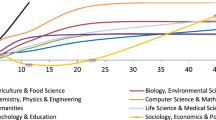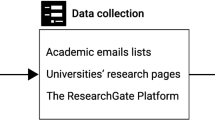Abstract
Crowdsourcing comprises a variety of creative contests, and its success is closely related to the quantity and quality of solvers. The research model of factors influencing the quantity and quality of solvers with respect to contest arrangement attributes and market competition situation has been developed in this paper, and the model has been tested with data from a crowdsourcing website in China. The results show that higher awards, easier tasks, longer duration and lower competition intensity lead to a higher number of solvers. Higher awards, longer duration and higher difficulty level of tasks lead to higher ability level of winners, but competition intensity and market price for other competing projects do not show significant correlation with the ability level of winners.




Similar content being viewed by others
References
Allion, R. J. (2003). CEO interview: the InnoCentive Model of open innovation. Strategy & Leadership, 32(4), 4–9.
Balachandra, R., & Friar, J. H. (1997). Factors for success in R&D projects and new product innovation: a contextual framework. IEEE Transaction. On Engineering Management, 44(8), 276–287.
Brabham, D. C. (2008). Crowdsourcing as a model for problem solving. The International Journal of Research into New Media Technologies, 14(1), 75–90.
Brown, S. L., & Eisenhardt, K. M. (1995). Product development: past research, present findings, and future directions. Management Review, 20(4), 343–378.
Chesbrough, H. (2003). Open innovation: The new imperative for creating and profiting from technology. Cambridge: Harvard Business School Press.
Cusumano, M. A., & Nobeoka, K. (1992). Strategy, structure and performance in product development-Observations from the auto industry. Research Policy, 21(1), 265–293.
Frey, B. (1997). Not just for the money: An economic theory of personal motivation. Brookfield: Edward Elgar Publishing Company.
Fullerton, R. L., & McAfee, R. P. (1999). Auctioning entry into tournaments. Political Economy, 107(3), 573–605.
Griffin, A. (1997). The effect of project and process characteristics on product development cycle time. Marketing Research., 34(2), 24–35.
Howe, J. (2006). The rise of croudsourcing. Wired, 6, 227–264.
iResearch. (2010). China Witkey Industrial White Paper, 11, 2010.
Krishnan, V., & Ulrich, K. T. (2001). Product development decisions: a review of the literature. Management Science, 47(1), 1–21.
Lakhani., K. (2007). The principles of distributed innovation. Innovations, 23, 97–112.
Laursen, K., & Salter, A. (2005). The paradox of openness in innovative search: appropriability and the use of external sources of knowledge for innovation. Strategic Management Journal, 25, 467–493.
Lazear, E. P., & Rosen, S. (1981). Rank-order tournaments as optimum labor contracts. Journal of Political Economy, 89, 841–864.
Leimeister, J., & Huber, M. (2009). Leveraging crowdsourcing: activation-supporting components for IT-based ideas competition. Journal of Management Information Systems, 26(1), 197–224.
Lerner, J., & Tirole, J. (2002). Some simple economics of open source. Journal of Industrial Economics, 50, 197–234.
Loch, C. H., & Kavadias, S. (2007). Handbook of new product development management. Burlington: Butterworth Henineman-Elsevier.
Ocasio, W. (1997). Towards an attention-based view of the firm. Strategic Management Journal, 18, 187–206.
Shocker, A. D., & Srinivasan, V. (1979). Multiattribute approaches for product concept evaluation and generation: a critical review. Journal of Marketing Research, 16, 159–180.
Simon, H. A. (1997). Administrative behavior: A study of decision-making process in administrative organization. New York: Free Press.
Snir, E. M., & Hitt, L. M. (2003). Costly bidding in online markets for IT services. Management Science, 49, 1504–1520.
Sonsino, D., & Benzion, U. (2002). The complexity effects on choice with uncertainty–experimental evidence. The Economic Journal, 112, 936–965.
Taylor, W. C. (1995). Digging for golden carrots: an analysis of research tournament. American Economics Research, 85(4), 872–890.
Terwiesch, C., & Xu, Y. (2008). Innovation contest, open innovation and multi-agent problem solving. Management science, 54, 1529–1543.
Yang, Y., & Chen. P. (2009). Open Innovation: Strategic Design of Online Contests. Proceeding of International Conference on Information Systems 2009, Pheonix, Arizona.
Yang, Y., & Chen. P. (2010). Who Will Win? Secrets behind Innovation Contests. Proceedings of International Conference on Information Systems 2010, Saint Louis, Missouri.
Acknowledgement
This research was supported by the National Social Science Foundation of China (No. 09CTQ023), Natural Science Foundation Project of CQ CSTC (No.2008BB2042), and Science and Technology Innovation Fund for individual Graduate Students of Chongqing University (CDJXS11020023).
Author information
Authors and Affiliations
Corresponding author
Additional information
Responsible editor: Xin Luo
Rights and permissions
About this article
Cite this article
Shao, B., Shi, L., Xu, B. et al. Factors affecting participation of solvers in crowdsourcing: an empirical study from China. Electron Markets 22, 73–82 (2012). https://doi.org/10.1007/s12525-012-0093-3
Received:
Accepted:
Published:
Issue Date:
DOI: https://doi.org/10.1007/s12525-012-0093-3




